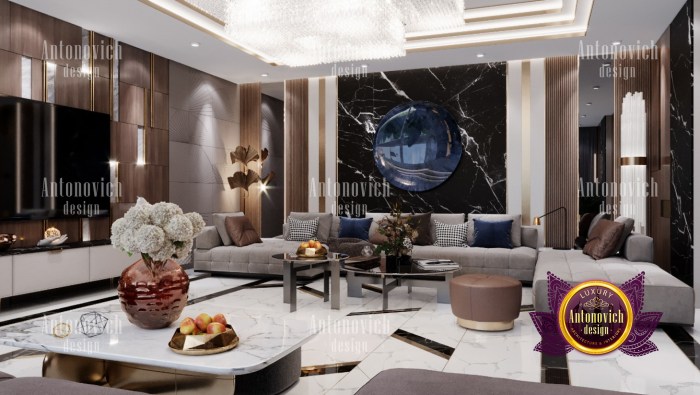
Luxury real estate ultra-high-net-worth buyers represents a unique segment of the property market that combines opulence with exclusivity. As the demand for high-end homes continues to soar, understanding the intricacies of this market becomes essential for both buyers and sellers. Luxury real estate is not just about lavish amenities; it’s about the lifestyle, location, and status that come with owning such properties.
This market appeals to ultra-high-net-worth individuals who seek not only a place to live but also an investment that reflects their success and taste. From smart home technologies to stunning architectural designs, the features of these luxury properties are tailored to meet the sophisticated needs and desires of affluent buyers.
Understanding Luxury Real Estate
Luxury real estate refers to high-end properties that stand out in the market due to their unique features, location, and exclusivity. In today’s competitive landscape, these properties play a significant role, catering to the desires of affluent buyers. The luxury market has seen a remarkable shift, becoming a symbol of status and an investment opportunity, rather than just a place to live.Luxury homes are characterized by exceptional quality, unique architectural designs, and superior locations.
These properties often include high-end finishes, advanced technologies, and premium amenities. Key features may range from expansive square footage to private pools and breathtaking views, making them distinct from standard properties. Moreover, the appeal to ultra-high-net-worth buyers lies in the exclusivity and prestige these properties offer, often serving as a status symbol within their social circles.
Profile of Ultra-High-Net-Worth Buyers

Ultra-high-net-worth individuals (UHNWIs) are defined as those possessing assets exceeding $30 million. This demographic is composed of entrepreneurs, executives, and investors who often prioritize unique investments and experiences. Understanding their preferences is crucial for anyone involved in luxury real estate.These buyers typically seek properties that reflect their lifestyle, often favoring locations that offer both privacy and convenience. They are motivated by various factors including investment potential, personal enjoyment, and legacy considerations.
Furthermore, psychological factors such as a desire for exclusivity and the emotional connection to a property play a significant role in their purchasing decisions.
Trends in the Luxury Real Estate Market
The luxury real estate market is constantly evolving, shaped by various trends that influence buyer behavior. Current trends include a growing demand for sustainable and eco-friendly properties, as buyers increasingly prioritize environmental impact. Additionally, the integration of technology and enhanced security features are becoming crucial aspects for luxury properties.Emerging property features that attract buyers include wellness amenities, such as home gyms and spa-like bathrooms, as well as outdoor living spaces designed for entertaining.
Global events, such as economic shifts and pandemics, have also impacted luxury real estate demand; for instance, remote work has spurred interest in vacation homes and properties in less densely populated areas.
Real Estate Investment Strategies
For ultra-high-net-worth buyers, effective investment strategies in luxury real estate may involve diversification and long-term planning. These strategies often include identifying emerging markets, investing in properties that may appreciate in value due to urban development, and acquiring unique properties that offer rental potential.Successful cases of luxury real estate investments often illustrate the benefits of strategic acquisitions. For example, a buyer investing in a luxury condo in a rapidly growing city may experience significant returns as the area develops.
Potential investments can be evaluated based on factors such as location, property condition, and market trends, providing a comprehensive overview for any serious investor.
Smart Home Technology in Luxury Real Estate
The integration of smart home technology has become a hallmark of luxury properties, enhancing convenience, security, and energy efficiency. From automated lighting systems to advanced climate control, these features appeal to ultra-high-net-worth buyers looking for modern living experiences.Benefits of smart home technology include increased home security, energy savings, and the ability to control various aspects of the home remotely. Recent innovations, such as voice-activated assistants and advanced surveillance systems, are particularly relevant, as they add layers of comfort and safety to luxury homes.
The Role of Commercial Real Estate
Luxury residential real estate and commercial real estate often intersect, presenting unique investment opportunities for ultra-high-net-worth buyers. Many investors diversify their portfolios by exploring commercial properties such as retail spaces, office buildings, and mixed-use developments.Opportunities in the commercial sector include investing in high-demand areas with significant growth potential. Successful transitions between residential and commercial luxury investments can be seen in cases where buyers leverage their expertise in residential properties to navigate the commercial market effectively.
Marketing Strategies for Luxury Homes
Effective marketing techniques are essential for selling luxury real estate, often requiring a tailored approach. High-quality visuals, immersive virtual tours, and storytelling are critical components in showcasing the unique aspects of a property. Branding luxury properties involves highlighting their exclusivity and unique features, presenting them in a way that resonates with ultra-high-net-worth buyers. Digital marketing plays a significant role in promoting luxury homes, leveraging social media, online listings, and targeted advertising to reach prospective buyers effectively.
Challenges in Luxury Real Estate Transactions
Buying or selling luxury homes does come with its challenges. Common obstacles include navigating complex legal considerations, understanding zoning regulations, and managing negotiations that can become contentious. Legal considerations in luxury real estate transactions often require specialized knowledge, as the stakes can be significantly higher. Solutions for mitigating risks in these deals include working with experienced legal counsel and conducting thorough due diligence to ensure a smooth transaction process.
Wrap-Up
In summary, the world of luxury real estate catering to ultra-high-net-worth buyers is both dynamic and complex. It reveals not only the preferences and motivations of wealthy individuals but also the emerging trends and investment strategies that define this exclusive market. As the landscape evolves, staying informed on market movements, technological advancements, and effective marketing strategies will be crucial for anyone involved in luxury real estate transactions.
FAQ Resource
What defines luxury real estate?
Luxury real estate is characterized by high-value properties that offer superior design, location, and exclusive features appealing to affluent buyers.
What are common preferences of ultra-high-net-worth buyers?
These buyers typically seek properties with premium amenities, privacy, and proximity to elite services and lifestyle options.
How do global events affect luxury real estate?
Global events can significantly impact demand and pricing in luxury real estate, as they influence buyer confidence and investment trends.
What role does smart home technology play in luxury properties?
Smart home technology enhances convenience, security, and energy efficiency, making properties more attractive to tech-savvy buyers.
What challenges are common in luxury real estate transactions?
Challenges include navigating complex regulations, high competition, and the need for extensive due diligence in evaluating properties.





